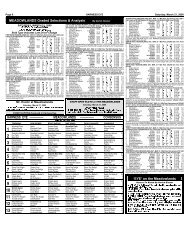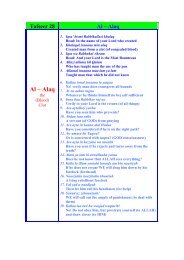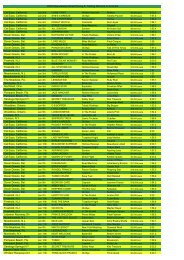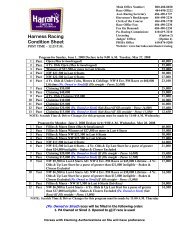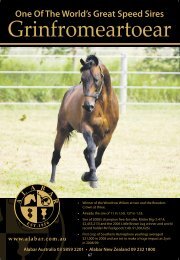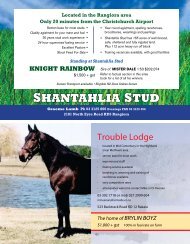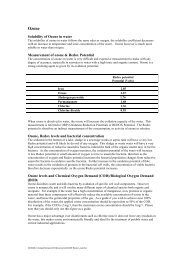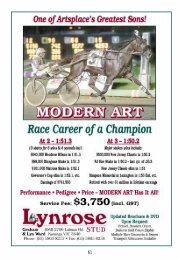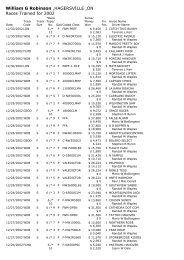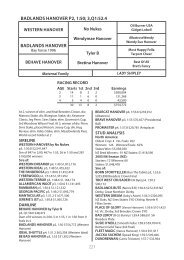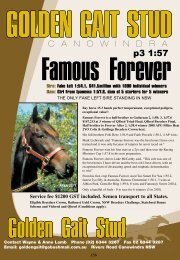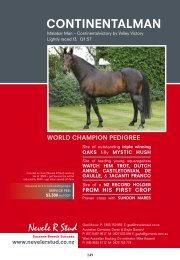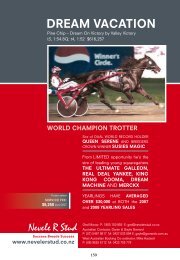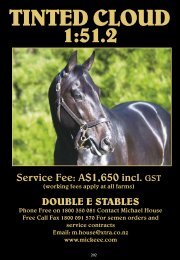Stallions - Harnesslink
Stallions - Harnesslink
Stallions - Harnesslink
You also want an ePaper? Increase the reach of your titles
YUMPU automatically turns print PDFs into web optimized ePapers that Google loves.
GUIDELINES FOR BREEDERS & STUDMASTERS<br />
Breeders need to read and be aware of the stud’s contractual terms and conditions. Those contracts are binding and will<br />
prevail in the event of a dispute. These notes are for guidance only and may help breeders make informed decisions.<br />
Special care is needed to ensure that discounts, deferred payment arrangements, veterinary fees and agistment charges<br />
are clear and agreed in writing.<br />
1. AGISTMENT RATES - Breeders should be aware of agistment charges for wet and dry mares before they take their mare<br />
to stud. Rates should be specified in the contract. Wet mares - means a mare with foal at foot. Dry mares - an empty<br />
mare.<br />
2. BAD DEBTS - Outstanding accounts may be sent to Harness Racing New Zealand (HRNZ) for collection under Rule<br />
1612. The Executive’s powers include refusing to register the resultant foal and placing the owner’s name and the<br />
arrears on the Unpaid Forfeit List.<br />
3. BREEDER - Under HRNZ rules, and most futurity series, the ‘breeder’ is the person who owns (i.e. named in the HRNZ<br />
register) the dam of the horse at the time it is foaled, or in the case of a foal conceived by embryo transfer the owner of<br />
the dam of the foal at the time of service.<br />
4. CARE - Contractual terms will apply. Studmasters shall care for the mare and foal in accordance with good standards<br />
of husbandry associated with standardbred studs in New Zealand and shall not be liable (for so long as the standards<br />
are followed) for injury or death of the mare or foal or the failure of a mare to get into foal. Risks can be covered by<br />
insurance.<br />
5. CONTRACT - The breeder and the studmaster should ensure that a written contract is signed before the mare is served.<br />
Contracts should be updated, and records kept (e.g. emails), of changes made to the contract, e.g. when a different<br />
stallion is used from that originally nominated. Discount and payment arrangements, if any and if different to the<br />
standard contract, should be clearly documented.<br />
6. DEPOSITS - Studs may charge a deposit to secure a booking to a stallion in heavy demand or of low fertility. If a breeder<br />
is required to make a deposit to secure a booking to a stallion, and the mare subsequently gets into foal to that<br />
stallion, that deposit will usually be credited in full to the service fee.<br />
The contract should state unequivocally how much of the deposit will be returned to the breeder, if any, if the mare does<br />
not get into foal. Deposits will generally be forfeited if no attempt is made to breed the mare because a service has<br />
been booked.<br />
7. FOALING FEE - Breeders should make themselves aware of the foaling fee that a stud will charge.<br />
8. FREE RETURN - Breeders should read the contract carefully. Usually if a mare fails to produce a live foal there is a free<br />
return for the same mare, or an approved substitute mare, to the same stallion during the next season only. Where the<br />
stallion, or his frozen semen, is not available and a substitute cannot be agreed the broodmare owner is entitled to a<br />
refund of the service fee, less costs incurred or a working fee.<br />
A free return service is usually available to the contracted breeder if the service fee has been paid as per the contract,<br />
i.e. usually within 30 days of invoice after a 42-day positive test.<br />
9. FREEZE BRANDING AND PARENTAGE VERIFICATION - Foals may be freeze-branded and DNA tested while at stud.<br />
From the 2004-05 season mares are being included in the DNA database as foals are born. Owners are responsible for<br />
organising the branding of foals born at home, or for those that return home from the stud prior to branding. HRNZ will<br />
invoice the owner directly for this charge.<br />
10. G.S.T. - Breeders need to be clear if charges and fees are GST inclusive or not.<br />
11. LIVE FOAL - The contractual definition will apply. Traditionally a ‘live foal’ is defined as a foal that has stood and<br />
suckled its mother for a period of at least seven days. Exceptions include any foal which is born deformed and for<br />
which a veterinarian has recommended euthanasia. A copy of the veterinarian’s certificate should be sent to both the<br />
studmaster and the broodmare’s owner. The studmaster and veterinarian may agree an extension of the seven day live<br />
foal guarantee period, but this must be agreed and documented, prior to the expiry of the seven day period.<br />
5



